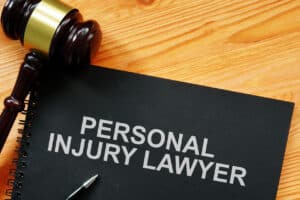How Do Personal Injury Settlements Work?
If you’ve been injured in an accident caused by the negligence of another, you may be entitled to recover compensation for your damages in a personal injury lawsuit. Your compensation in a personal injury case can encompass a variety of items, from economic damages such as medical bills and lost wages to non-economic damages such as pain and suffering.
While some lawsuits will go to trial, many personal injury cases are settled prior to the trial date. Settlements are often preferred as they allow you to receive your money faster and eliminate the risk that you will receive nothing if the trial is resolved in favor of the defendant. In order to ensure you receive a settlement that covers the total extent of your damages, it’s important to understand how personal injury settlements work. In addition, it’s critical to work with an experienced personal injury lawyer who can help you navigate the process properly.
What Is a Personal Injury Settlement?
 A personal injury settlement is an agreement entered into between both parties. As part of this agreement, the injured victim receives a certain amount of money in return for agreeing to drop the lawsuit. Settlements can occur prior to the trial starting. In these situations, the case won’t go to trial. However, settlements can also be reached in the middle of the trial. In these instances, the trial is discontinued once the settlement is reached.
A personal injury settlement is an agreement entered into between both parties. As part of this agreement, the injured victim receives a certain amount of money in return for agreeing to drop the lawsuit. Settlements can occur prior to the trial starting. In these situations, the case won’t go to trial. However, settlements can also be reached in the middle of the trial. In these instances, the trial is discontinued once the settlement is reached.
It usually takes several rounds of negotiations to reach a personal injury settlement. While every case is unique, the settlement process typically includes the following steps:
- The injured victim submits a letter outlining the compensation requested for the damages associated with the accident.
- The defendant replies with a counter-offer that is typically much lower than the initial compensation request.
- Both parties exchange a series of counter-offers until an agreement is reached.
- In some instances, a mediator may be brought in if both sides aren’t able to reach an agreement on their own. The mediator is a neutral third party who facilitates the negotiating process.
Once an agreement is reached, the injured victim will receive a settlement check for the agreed-upon amount in exchange for promising not to file another claim against the defendant related to this incident. In the event that a settlement isn’t reached, the case will proceed to trial.
How Is Your Personal Injury Settlement Divided?
It’s important to understand that you don’t receive the total settlement. There are certain costs and fees that must be deducted from your settlement before you receive your compensation. These may include:
- Medical liens
- Attorney fees
- Additional legal expenses
- Taxes
Medical Liens
In many instances, your insurance company will lay out money for your medical treatment after the accident. This is very common, especially since the medical bills for serious accidents are often very high, and many personal injury victims don’t have the money to lay out for this expensive treatment. When your case is settled, the insurance company will be reimbursed for these upfront payments out of the settlement you receive.
Attorney Fees
Most personal injury lawyers work on a contingency fee basis. This means you don’t pay them an hourly rate. Instead, your lawyer receives a percentage of your settlement as payment and if you don’t receive any compensation, you pay no legal fees.
The percentage owed as a contingency fee will be agreed upon at the start of the case, and you will sign a contract explaining the fee policy in detail. Once your case is settled, the attorney fees will be deducted from the total compensation so that your legal team is paid for the work they did on your case.
Additional Legal Expenses
There are other fees that may be incurred as part of a personal injury case. These may include:
- Court filing fees
- Certified copy fees
- Fees for expert witnesses who testify on your behalf
- Postage
Your personal injury lawyer will generally lay out the money for these expenses when they occur during your case, and reimbursement for these fees will come from your settlement.
Taxes
In most situations, your personal injury settlement won’t be taxed. However, there are some types of damages that may potentially be subject to taxation. These include:
- Punitive damages levied to punish the negligent party for particularly egregious actions
- Damages based on emotional rather than physical injuries
- Any interest received on your settlement money
How to Increase Your Personal Injury Settlement
In order to ensure your settlement fairly compensates you for the total extent of your damages, you’ll want to take steps to maximize the value of your compensation. The following tips will help you to increase your personal injury settlement value so that you receive the full compensation to which you’re entitled:
- Seek medical attention immediately
- Document your damages
- Consider long-term damages
- Identify all liable parties
- Hire an experienced personal injury attorney
Seek Medical Attention Immediately
 In order to maximize the value of your compensation, it’s critical to seek medical attention immediately, even if you don’t think you’ve been seriously injured. Often, it can take days or weeks for injury symptoms to develop after a serious accident, and delaying medical treatment can potentially have devastating consequences.
In order to maximize the value of your compensation, it’s critical to seek medical attention immediately, even if you don’t think you’ve been seriously injured. Often, it can take days or weeks for injury symptoms to develop after a serious accident, and delaying medical treatment can potentially have devastating consequences.
Seeking prompt medical attention can help increase the value of your settlement in several ways:
- It can document that your injuries were directly caused by the accident, making it more challenging for the insurance company to claim they occurred at a later date.
- It ensures you took every possible step to receive the treatment you need. This can prevent the insurance company from claiming your failure to seek prompt treatment exacerbated your injuries and should reduce the compensation to which you’re entitled.
Document Your Damages
Documenting your damages is critical to your ability to maximize the value of your compensation. The insurance company won’t just take your word on the value of your damages. You will need to provide documentation of the expenses you incurred as a result of the accident that caused your injuries, including:
- All medical expenses and rehabilitation costs
- Lost wages
- Property damage
Make sure you keep all bills for treatment and receipts for any payments you made. In addition, keep any documentation of lost wages (this can generally be provided with pay stubs). Take photos of your injuries and any property damage to document the extent of these damages. This will provide concrete evidence of the costs you incurred, and it will place you in a stronger position to increase the value of your settlement.
Consider Long-Term Damages
You can increase the amount of your personal injury settlement by factoring in all the ways your injuries may impact your life in the future. These long-term damages should be considered when determining the value of your settlement. Some long-term damages to consider include:
- Future medical expenses that will be required if ongoing treatment will be necessary after your case is settled
- Ways in which the accident negatively impacts your long-term career advancement or your ability to perform a job that pays as much as you earned prior to the injury
- Any long-term decrease in quality of life experienced after the injury
Identify All Liable Parties
Sometimes more than one negligent party may be responsible for your injuries. By identifying all liable parties, you can pursue compensation from everyone involved, and this can potentially increase your total compensation.
Identifying all liable parties is especially important in situations where the person primarily at fault doesn’t have enough insurance coverage or financial assets to pay for all the damages to which you’re entitled. By pursuing compensation from additional liable parties, you can capture a larger percentage of the compensation you’re owed.
Hire an Experienced Personal Injury Attorney
 The single most impactful step you can take to increase the value of your settlement is to hire an experienced personal injury lawyer. A study by the Insurance Research Council found that individuals who hire a personal injury lawyer received 3.5 times higher settlement payouts on average than individuals who didn’t work with an attorney. This increase in settlement value more than compensates for the amount of money you’d pay in lawyer fees.
The single most impactful step you can take to increase the value of your settlement is to hire an experienced personal injury lawyer. A study by the Insurance Research Council found that individuals who hire a personal injury lawyer received 3.5 times higher settlement payouts on average than individuals who didn’t work with an attorney. This increase in settlement value more than compensates for the amount of money you’d pay in lawyer fees.
There are several ways working with an experienced personal injury attorney will help increase the value of your settlement:
- Investigating your accident – Your lawyer will conduct a thorough investigation of your accident to gather evidence which will support your claim. This may include interviewing eyewitnesses, compiling medical records, analyzing evidence at the accident scene, and talking with expert witnesses. This evidence can play an important role in proving liability and demonstrating the total extent of your damages.
- Estimating the value of your damages – Certain aspects of your damages are easy to document, such as your current medical bills and any lost wages you’ve incurred. But there may be other damages that should be considered which are more difficult for you to estimate on your own, such as the cost of future medical treatments that may be necessary, long-term negative impact on your earning potential, or the value of non-economic damages such as pain and suffering. Your lawyer will factor these items into your settlement to ensure your compensation reflects the total value of your damages.
- Identifying all liable parties – If more than one party is potentially liable for your damages, working with a lawyer will ensure all parties are included in the lawsuit. This will help you maximize the value of your settlement.
- Negotiating with insurance companies – Insurance companies will go to great lengths to minimize the amount of money they have to pay out on your claim. An experienced lawyer can handle these negotiations to ensure the settlement offer by the insurance company provides fair compensation for your damages. If the insurance company fails to make a fair offer, your lawyer can advise you that it’s best to pursue your compensation in court.
- Representing you in court – In the event that your case goes to trial, your personal injury lawyer will represent you throughout the process to ensure your case is handled properly. This increases the likelihood that you’ll achieve a successful outcome that maximizes the value of your compensation.
How Is Your Personal Injury Settlement Paid?
 You have two options regarding how you receive your personal injury settlement:
You have two options regarding how you receive your personal injury settlement:
- Lump sum payments – You receive the entire amount of your settlement at once in a single payment. This is the most common way personal injury settlements are paid.
- Structured payments – You receive your settlement in a series of smaller payments over a period of months or years.
You can generally decide the way you want to receive your settlement. Lump sum payments are typically beneficial since it allows you to pay off all debts associated with your injuries right away, and then you have control of the remaining money.
Structured payments may make it more challenging to pay all your debts off immediately, and it leaves the defendant in control of the money you’re owed for a longer period of time. However, if you struggle to manage your finances, you may find that a structured payment settlement is a better option for you so that you can receive a consistent amount of money each month.
Pushchak Law Can Help
If you’ve been injured due to the negligent actions of another, Pushchak Law can help you recover the compensation you deserve. Brian Pushchak has resolved hundreds of personal injury claims for individuals in the Denver area. He knows the complex laws that apply to these cases, and he can help you maximize the value of your settlement.
You’ll benefit from our unique Informed Decisions™ Approach focused on helping you achieve the best possible outcome to your case. This approach keeps you in control of the process at all times. Mr. Pushchak will discuss your goals for the case with you and then provide detailed information about your legal rights and options. He’ll recommend the best strategy to achieve your desired outcome and answer any questions you may have. Once you understand Mr. Pushchak’s recommendations, you’ll have the final say on how your case is handled.
While Mr. Pushchak always strives to settle your case whenever possible, he’s prepared to pursue your compensation in court if a settlement isn’t in your best interest. Mr. Pushchak has the extensive trial experience necessary to give you the greatest likelihood of a successful outcome in the event that your case is resolved in court.
Contact us today to schedule a free consultation. Pushchak Law serves clients in Denver and the surrounding areas of Colorado.
- How Not Wearing a Helmet Impacts Your Motorcycle Accident Case - January 21, 2026
- How to Get a Colorado Motorcycle License - January 20, 2026
- Motorcycle Accidents and Brain Injuries - January 20, 2026
Free Case Consultation
If you have been injured and would like to speak with one of our attorneys, take advantage of our free, no-obligation consultation. And if you have a viable case, there are no fees until we win.
Call 303.372.6145

